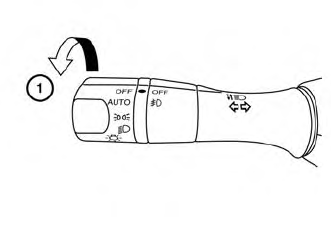Nissan Murano: Lane Departure Warning (LDW) (if so equipped) / LDW system limitations
Nissan Murano (Z52) 2015-2024 Owners Manual / Starting and driving / Lane Departure Warning (LDW) (if so equipped) / LDW system limitations
WARNING
Listed below are the system limitations for the LDWsystem. Failure to follow the warnings and instructions for proper use of the LDW system could result in serious injury or death.
- The system will not operate at speeds below approximately 37mph(60 km/h) or if it cannot detect lane markers.
- Do not use the LDWsystem under the
following conditions as it may not
function properly:
- During bad weather (rain, fog, snow, etc.).
- When driving on slippery roads, such as on ice or snow.
- When driving on winding or uneven roads.
- When there is a lane closure due to road repairs.
- When driving in a makeshift or temporary lane.
- When driving on roads where the lane width is too narrow.
- When driving without normal tire conditions (for example, tire wear, low tire pressure, installation of spare tire, tire chains, nonstandard wheels).
- When the vehicle is equipped with non-original brake parts or suspension parts.
- When you are towing a trailer or other vehicle.
- The system may not function properly under the following conditions:
- On roads where there are multiple parallel lane markers; lane markers that are faded or not painted clearly; yellow painted lane markers; non-standard lane markers; or lane markers covered with water, dirt, snow, etc.
- On roads where the discontinued lane markers are still detectable.
- On roads where there are sharp curves.
- On roads where there are sharply contrasting objects, such as shadows, snow, water, wheel ruts, seams or lines remaining after road repairs. (The LDWsystem could detect these items as lane markers.)
- On roads where the traveling lane merges or separates.
- When the vehicle’s traveling direction does not align with the lane marker.
- When traveling close to the vehicle in front of you, which obstructs the lane camera unit detection range.
- When rain, snow, dirt or an object adheres to the windshield in front of the lane camera unit.
- When the headlights are not bright due to dirt on the lens or if the aiming is not adjusted properly.
- When strong light enters the lane camera unit. (For example, the light directly shines on the front of the vehicle at sunrise or sunset.)
- When a sudden change in brightness occurs. (For example, when the vehicle enters or exits a tunnel or under a bridge.)
 How to enable/disable the LDW system
How to enable/disable the LDW system
Perform the following steps to enable or
disable the LDW system.
Using “Settings” in the vehicle information
display:
Press the button until
“Settings”
displays in the vehicle information display
and then press the OK button...
 System temporarily unavailable
System temporarily unavailable
If the vehicle is parked in direct sunlight
under high temperature conditions (over
approximately 104°F [40°C]) and then
started, the LDW system may be deactivated
automatically and the following
message will appear in the vehicle information
display: “Unavailable: High Cabin
Temperature...
Other information:
Nissan Murano (Z52) 2015-2024 Service Manual: Interior Lighting System :: Service Data and Specifications (sds). Service Data and Specifications (sds)
Bulb Specifications Item Wattage (W)* Front room/map lamp assembly – Vanity lamp 2 Glove box lamp 1.4 Personal lamp 2nd row – Luggage room lamp 5 Mood lamp (front console) – Mood lamp (rear console) – Mood lamp (door armrest) – *: Always check with the Parts Department for the latest parts information...
Nissan Murano (Z52) 2015-2024 Service Manual: U1000 Can Comm Circuit
DTC Description CAN (Controller Area Network) is a serial communication system for real time application. It is an on-Nissan Murano vehicle multiplex communication system with high data communication speed and excellent error detection ability. Many electronic control units are equipped in Nissan Murano vehicles, and each control unit shares information and links with other control units during operation (not independent)...
Categories
- Manuals Home
- Nissan Murano Owners Manual
- Nissan Murano Service Manual
- Fuel recommendation
- Vehicle Dynamic Control (VDC) OFF switch
- Rear bench seat adjustment
- New on site
- Most important about car
Autolight system

The autolight system allows the headlights to turn on and off automatically. The autolight system can:
Turn on the headlights, front parking, tail, license plate and instrument panel lights automatically when it is dark. Turn off all the lights (except daylight running lights) when it is light. Keep all the lights on for a period of time after you place the ignition switch in the OFF position and all doors are closed.
Copyright © 2025 www.nimurano.com
